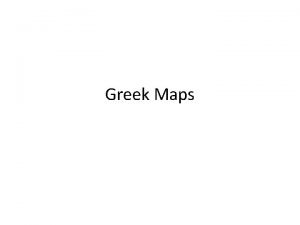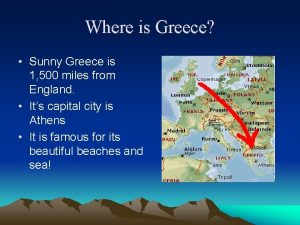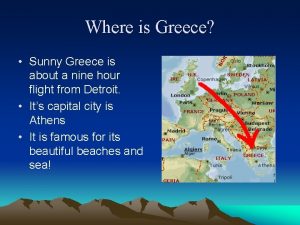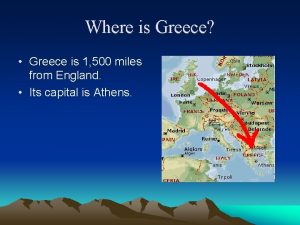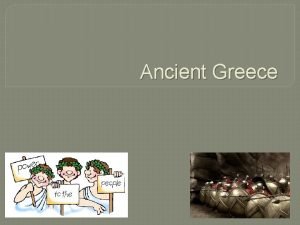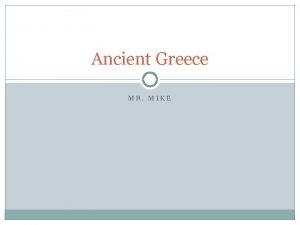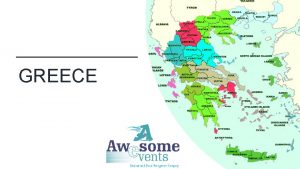Where is Greece Sunny Greece is 1 500












- Slides: 12

Where is Greece? • Sunny Greece is 1, 500 miles from England. • It’s capital city is Athens • It is famous for its beautiful beaches and sea!

Ancient Greece • In Ancient Greece, the different cities were at war with each other. • The most fearsome fighters came from the town of Sparta.

The Climate • The climate is Mediterranean. • The Mediterranean Sea affects the Greek climate, cooling the air in summer and providing warmth in winter. • The warm summers are cooled by a seasonal breezes from the Mediterranean called the ‘Meltemia’.

The Climate - Summer • The Greek summer is hot and dry. • On average the sun shines for 3, 000 hours per year. • The average temperature is 33°. • In Britain it is 15°. • The average rainfall is 6 mm. • In Britain it is 76 mm.

The Climate - winter • The Greek winter is moderate. It can be rainy on costal regions and snowy in the mountains. • The average temperature is 15°. • In Britain it is 4°, sometimes falling to -10°. • The average rainfall is 65 mm. • In Britain it is over 100 mm.

Ancient greece - terrain • Greece has a very scenic landscape. • The terrain of Greece is very varied. • There are mountains, valleys and coasts. • The high mountains are separated by deep valleys through which rivers flow.

• No part of Greece is more than about forty miles from the coast Ancient greece - terrain (a couple of days walking). • There are lots of islands surrounding Greece. • However, millions of years ago the seabed was completely dry!

soil and plants • Vegetation is dependent on geographical regions. • Due to the variety of land, there a some 6, 000 indigenous species in Greece. • In Ancient Greece, farmers grew olives, figs, grain, fruit and grapes in the fertile valleys.

Soil and plants • However, other parts of Ancient Greece had drier soil and less vegetation, particularly around the cities. • Although surrounded by sea water, they found it difficult to find fresh water away from the valleys. • The high mountains also prevented large-scale farming, so the Greeks were forced to look beyond their own country for fertile land.

volcanic • Another important aspect of the Greek environment is that it is very unstable. • Greece is in the middle of a very volcanic zone, between the European and African tectonic plates. • There are several active volcanoes and earthquakes are common.

Time Line 776 BC about 750 BC The first Olympic games. Early Greek culture. Homer '. writes the epics 'The Iliad' and the 'Odyssey 650 - 580 BC 508 BC Corinth is ruled by the tyrant Kypselos and then his son Periander. Democracy begins in Athens 490 and 480 BC Greeks defeat Persian invaders at the battles of Marathon (490 BC)and Salamis (480 BC). by 450 BC Athens becomes a very powerful city, and controls an empire. 472 - 410 BC Greeks theatre thrives in Athens. Many of the most famous Greek plays are written during this time.

Time line • 462 - 429 BC Perikles is the popular leader at Athens as the general of the Athenian army 432 BC The Parthenon in Athens is finished being built. 431 - 404 BC War between Athens and Sparta (the Peloponnesian war) 428 BC The revolt of Mytilene 404 BC Sparta defeats Athens. 338 BC Philip, king of Macedonia, takes control of Greece 336 - 323 BC Alexander the Great, son of Philip, conquers most of the known world as far east as India. 146 BC Rome conquers Greece - Greece becomes part of the Roman empire.

